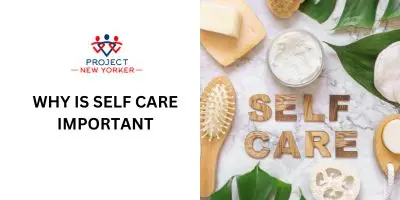Why Is Self Care Important

Self-care is crucial for maintaining physical and mental well-being. It helps reduce stress and prevent burnout.
Self-care involves activities that promote health and happiness. These activities include exercise, healthy eating, sleep, and relaxation. Taking time for oneself improves mental health and emotional stability. It enhances productivity and focus by preventing exhaustion. Regular self-care practices can boost self-esteem and confidence.
Neglecting self-care can lead to chronic stress and health issues. Prioritizing self-care ensures a balanced and fulfilling life. It’s essential for overall well-being and long-term success. Make self-care a daily habit for optimal health.
Physical Health Benefits
Self-care is essential for maintaining a balanced life. Prioritizing self-care can lead to numerous physical health benefits. Taking care of your body not only improves your overall health but also boosts your immune system. Let’s dive into how self-care can enhance your physical well-being.
Improves Overall Health
Self-care practices significantly improve overall health. Regular physical activity, healthy eating, and adequate sleep contribute to a healthier body. Exercising daily helps maintain a healthy weight, strengthens muscles, and improves cardiovascular health.
- Exercise – Reduces the risk of chronic diseases like diabetes and heart disease.
- Healthy Eating – Provides essential nutrients to keep the body functioning optimally.
- Sleep – Vital for recovery, mental clarity, and physical performance.
These self-care practices also enhance mental health. Physical activity releases endorphins, which improve mood and reduce stress. A balanced diet supports brain function, and sufficient sleep helps manage anxiety and depression.
| Self-Care Practice | Health Benefit |
|---|---|
| Exercise | Reduces risk of chronic diseases |
| Healthy Eating | Provides essential nutrients |
| Sleep | Enhances recovery and mental clarity |
Boosts Immune System
Practicing self-care can boost your immune system. A strong immune system helps the body fight off infections and illnesses more effectively. Key self-care activities for boosting immunity include proper nutrition, regular exercise, and stress management.
- Proper Nutrition – Vitamins and minerals are crucial for immune function.
- Regular Exercise – Improves circulation, allowing immune cells to move freely.
- Stress Management – Reduces the production of stress hormones that weaken immunity.
A well-balanced diet rich in fruits, vegetables, and lean proteins provides the body with essential nutrients. These nutrients, such as vitamins C and D, zinc, and antioxidants, support immune health. Regular physical activity enhances circulation, which helps immune cells travel more efficiently throughout the body.
Stress management techniques like meditation, deep breathing exercises, and adequate sleep can reduce stress levels. Lower stress levels help maintain a stronger immune response, making you less susceptible to illnesses.
| Self-Care Activity | Immune System Benefit |
|---|---|
| Proper Nutrition | Provides essential nutrients for immune function |
| Regular Exercise | Improves circulation of immune cells |
| Stress Management | Reduces stress hormones |
Mental Health Benefits
Self-care is essential for overall well-being. It impacts every part of our lives. One crucial aspect is the mental health benefits. Taking care of yourself mentally can lead to a happier and healthier life. Let’s explore why self-care is important for mental health.
Reduces Stress And Anxiety
One of the significant benefits of self-care is reducing stress and anxiety. Stress and anxiety can affect your mood, sleep, and overall health. Engaging in self-care activities can help you manage these feelings. Here are some ways self-care reduces stress and anxiety:
- Relaxation techniques: Practices like meditation and deep breathing calm your mind.
- Physical activities: Exercise releases endorphins, which are natural stress relievers.
- Time management: Planning your day can reduce feelings of being overwhelmed.
- Healthy eating: Nutritious food fuels your body and mind, reducing stress levels.
Consider the following table for a quick overview:
| Activity | Benefit |
|---|---|
| Meditation | Calms the mind |
| Exercise | Releases endorphins |
| Planning | Reduces overwhelm |
| Healthy Eating | Fuels body and mind |
Making time for self-care can greatly reduce stress and anxiety. Simple activities like reading a book, taking a walk, or practicing yoga can make a big difference. Remember, reducing stress and anxiety starts with small steps.
Improves Mood
Another critical benefit of self-care is improving your mood. A positive mood can enhance your quality of life. Here are some self-care practices that can boost your mood:
- Getting enough sleep: A good night’s sleep can make you feel refreshed and happy.
- Connecting with loved ones: Social interactions lift your spirits and provide emotional support.
- Engaging in hobbies: Activities you enjoy can bring joy and satisfaction.
- Practicing gratitude: Focusing on what you’re thankful for can foster a positive outlook.
Here’s a quick list of mood-boosting activities:
- Sleep well
- Socialize with friends and family
- Enjoy your hobbies
- Practice gratitude
Engaging in these activities can significantly improve your mood. A positive mood can lead to better relationships and increased productivity. So, take time for yourself and do what makes you happy. Improving your mood is a vital part of self-care.
Emotional Well-being
Self-care is vital for maintaining overall health, and it plays a crucial role in our emotional well-being. Emotional well-being ensures we feel balanced, content, and capable of handling life’s challenges. It involves understanding and managing our emotions effectively. Prioritizing self-care can significantly impact our emotional health, making us more resilient and positive.
Enhances Self-esteem
Self-care activities can greatly enhance self-esteem. When we take time to care for ourselves, we send a message to our brain that we are worthy and valuable. This can help in building a positive self-image. Regular self-care routines, like exercising, eating healthy, and grooming, boost our confidence and self-worth. Here are some ways self-care enhances self-esteem:
- Exercise: Physical activity releases endorphins, making us feel happier and more confident.
- Healthy Eating: Nutritious food fuels our body and mind, contributing to a better self-image.
- Grooming: Personal hygiene and grooming can improve our self-perception and how others see us.
- Setting Boundaries: Saying no to things that drain us helps in maintaining self-respect.
Additionally, self-care can involve mental activities like:
- Meditation: Helps in reducing stress and increasing self-awareness.
- Journaling: Writing down thoughts and feelings can clarify and validate them.
- Positive Affirmations: Repeating positive statements about oneself can boost self-esteem.
Consistently practicing self-care builds a strong foundation of self-esteem, making us feel more capable and deserving of good things in life.
Promotes Emotional Stability
Self-care is essential for promoting emotional stability. Emotional stability means having the ability to stay calm and manage stress effectively. Self-care practices help in regulating our emotions and reducing mood swings. Here are some self-care practices that promote emotional stability:
- Mindfulness: Being present in the moment helps in reducing anxiety and stress.
- Sleep: Adequate sleep is crucial for emotional regulation and mental clarity.
- Social Connections: Spending time with loved ones can provide emotional support and stability.
Consider the following table for a quick overview of self-care activities that promote emotional stability:
| Activity | Benefits |
|---|---|
| Meditation | Reduces stress, increases focus |
| Exercise | Releases endorphins, boosts mood |
| Healthy Diet | Improves mental clarity, mood |
| Sleep | Enhances mood, reduces irritability |
By integrating these self-care activities into our daily lives, we can achieve greater emotional stability. This makes us better equipped to handle life’s ups and downs with grace and resilience.
Prevent Burnout
Self-care is crucial for maintaining mental, emotional, and physical health. It is a proactive approach to personal well-being. One significant aspect of self-care is preventing burnout. Burnout can lead to severe stress, fatigue, and a sense of helplessness. By incorporating self-care practices into your daily routine, you can prevent burnout and maintain a balanced, healthy life.
Avoids Exhaustion
Exhaustion is one of the primary signs of burnout. Without proper self-care, the body and mind can become worn out. This can affect your ability to perform daily tasks. Here are some ways self-care helps to avoid exhaustion:
- Regular Breaks: Taking short breaks during work or study sessions can rejuvenate your mind.
- Healthy Diet: Eating a balanced diet provides the energy needed for daily activities.
- Exercise: Physical activity releases endorphins, which boost energy levels.
- Sleep: Ensuring adequate sleep helps the body recover and function efficiently.
Consider the following table that outlines activities to avoid exhaustion:
| Activity | Benefit |
|---|---|
| Meditation | Reduces stress and calms the mind |
| Walking | Improves circulation and mental clarity |
| Hydration | Keeps the body functioning optimally |
By including these self-care practices, you can stay energized and avoid exhaustion.
Increases Resilience
Resilience is the ability to bounce back from stress and challenges. Self-care plays a vital role in building and maintaining resilience. Here are some key points on how self-care increases resilience:
- Mindfulness: Practicing mindfulness can improve emotional regulation and stress management.
- Support System: Building a network of supportive friends and family provides emotional support.
- Hobbies: Engaging in hobbies you love can provide a sense of achievement and relaxation.
Below is a table that shows self-care activities that help build resilience:
| Activity | Resilience Benefit |
|---|---|
| Yoga | Enhances physical and mental strength |
| Reading | Provides mental escape and growth |
| Journaling | Helps process emotions and reflect |
Self-care activities build resilience by providing tools to handle stress and challenges effectively.
Enhances Relationships
Self-care is essential for maintaining mental and physical health. It also plays a crucial role in enhancing relationships. Taking time for yourself helps you become more present and engaged with others. This leads to stronger connections and better communication.
Improves Communication
When you practice self-care, your communication skills improve. You become more aware of your feelings and thoughts. This makes it easier to express yourself clearly and honestly. Here are some ways self-care improves communication:
- Reduces stress: Taking time to relax reduces stress. When you are less stressed, you can listen better and respond calmly.
- Increases empathy: Self-care helps you understand your own emotions. This makes it easier to relate to others.
- Boosts confidence: When you feel good about yourself, you communicate with confidence. This leads to more meaningful conversations.
Consider these self-care activities to improve communication:
| Activity | Benefit |
|---|---|
| Meditation | Clears your mind and reduces stress |
| Exercise | Boosts mood and energy levels |
| Journaling | Helps process emotions and thoughts |
Sets Boundaries
Self-care also helps in setting boundaries. Boundaries are important for maintaining healthy relationships. They ensure that you do not overextend yourself. Here’s how self-care helps set boundaries:
- Recognizes limits: Self-care allows you to understand your limits. You learn what you can and cannot handle.
- Prevents burnout: By taking breaks, you avoid burnout. This keeps your energy levels high for your relationships.
- Enhances respect: Setting boundaries teaches others to respect your needs and limits.
Here are some ways to set boundaries through self-care:
- Say no: Learn to say no when you need to. This protects your time and energy.
- Take breaks: Regular breaks prevent exhaustion. This keeps you available for meaningful interactions.
- Communicate needs: Express your needs clearly. This helps others understand your boundaries.
Self-care is not selfish. It is essential for maintaining healthy and fulfilling relationships.
Productivity And Focus
Self-care is essential for overall well-being. It directly impacts productivity and focus. Taking time to care for oneself helps the mind and body function better. This leads to better performance in daily tasks.
Increases Efficiency
Self-care significantly increases efficiency. Regular breaks prevent burnout. A well-rested mind works faster and makes fewer mistakes. Here are some ways self-care increases efficiency:
- Regular Sleep: Getting enough sleep improves cognitive functions.
- Healthy Diet: Nutritious food fuels the body and brain.
- Exercise: Physical activity boosts energy levels.
Consider the following table to understand the impact of self-care on efficiency:
| Self-Care Activity | Impact on Efficiency |
|---|---|
| Sleep | Improves memory and decision-making |
| Healthy Eating | Provides energy and improves concentration |
| Exercise | Reduces stress and boosts energy |
Practicing self-care leads to a more efficient and productive life. It ensures tasks are completed effectively and with higher quality.
Enhances Concentration
Self-care practices enhance concentration. A well-balanced mind focuses better on tasks. Here are some self-care activities that enhance concentration:
- Meditation: Calms the mind and improves focus.
- Mindful Breathing: Reduces stress and sharpens attention.
- Regular Breaks: Prevents mental fatigue and maintains focus.
Let’s examine how these activities impact concentration:
| Self-Care Activity | Impact on Concentration |
|---|---|
| Meditation | Enhances clarity and focus |
| Mindful Breathing | Reduces anxiety and improves attention span |
| Regular Breaks | Refreshes the mind and sustains focus |
Engaging in these activities helps maintain high levels of concentration. It ensures tasks are done with full attention and minimal distractions.
Frequently Asked Questions
Self-care improves mental health, reduces stress, and boosts overall well-being. It enhances productivity and promotes a balanced life.
Taking care of yourself boosts physical health, mental well-being, and productivity. It prevents burnout and enhances life quality. Prioritizing self-care helps maintain balance and reduces stress.
Personal care is crucial for maintaining hygiene, boosting self-esteem, and preventing illnesses. It supports physical and mental well-being.
7 pillars of self-care are mental well-being, physical activity, healthy eating, good sleep, stress management, positive relationships, and regular health check-ups.
Conclusion
Self-care is essential for mental and physical health. It boosts productivity, reduces stress, and enhances overall well-being. Prioritizing self-care leads to a happier, more balanced life. Embrace self-care habits to improve your daily routine and enjoy long-term benefits. Remember, taking care of yourself is a key to thriving.



